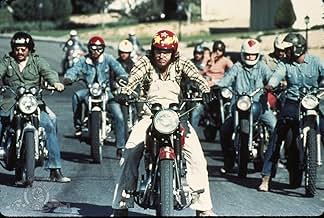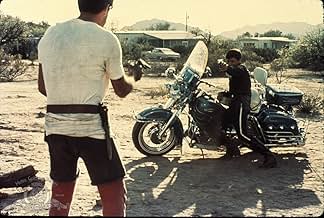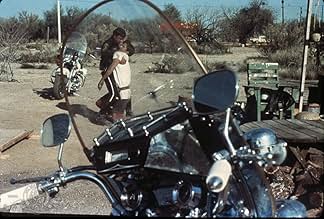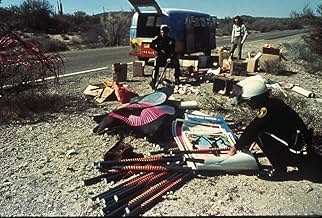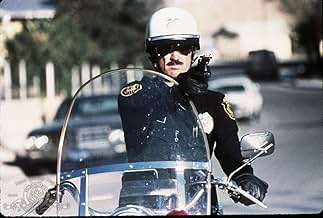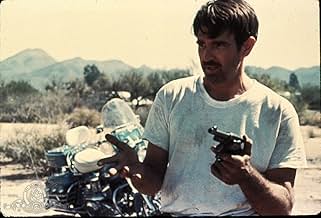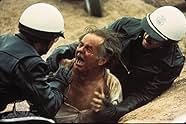IMDb-BEWERTUNG
7,0/10
6910
IHRE BEWERTUNG
Gelangweilt von seinen Aufgaben im Straßenverkehr wird der Motorradpolizist John Wintergreen aus Arizona dem Morddezernat zugeteilt, wo sein höflicher Ermittlungsstil seinen Macho-Chef verär... Alles lesenGelangweilt von seinen Aufgaben im Straßenverkehr wird der Motorradpolizist John Wintergreen aus Arizona dem Morddezernat zugeteilt, wo sein höflicher Ermittlungsstil seinen Macho-Chef verärgert.Gelangweilt von seinen Aufgaben im Straßenverkehr wird der Motorradpolizist John Wintergreen aus Arizona dem Morddezernat zugeteilt, wo sein höflicher Ermittlungsstil seinen Macho-Chef verärgert.
- Auszeichnungen
- 3 Nominierungen insgesamt
Billy Green Bush
- Zipper
- (as Billy 'Green' Bush)
Elisha Cook Jr.
- Willie
- (as Elisha Cook)
Hawk Wolinski
- VW Bus Driver
- (as David J. Wolinski)
Melissa Greene
- Zemko's Girlfriend
- (as Melissa Green)
Empfohlene Bewertungen
American music producer James William Guercio's one-off dalliance with filmmaking, ELECTRA GLIDE IN BLUE is made when he is only 28-year-old. It stars Robert Blake as a motorcycle cop Johnny Wintergreen who patrols rural Arizona highways and aspires to be a homicidal officer.
The movie opens with a promising panache hardly betrays that Guercio is a greenhorn, conjecturing through its voyeuristic close-ups, audience would soon realize a face-unshown man prepares to kill himself, yet, Guercio's camera also cunningly suggests that he is cooking beef streaks at the same time. Then, boom! He blows himself dead through a shotgun, which unusually aims to his chest rather than the usual easy target, the head, it compellingly sets a paradoxical situation that one immediately knows there is something fishy about the whole act.
Also, before the title card, Guercio takes a tongue-in-cheek tack to introduce our unlikely hero, big Johnny, the camera lurks and swirls in the apartment where Johnny expertly gratifies Jolene (Riley) in bed, before revealing that Johnny is small in stature. When a man's masculinity is stunted by his appearances, it gives audience an idea why he is so eager to achieve something, to compensate the ingrained inferiority complex is a shoo-in. So the apparent-suicidal case becomes his stepping stone to be recruited by detective Harve Poole (Ryan) for his astute observation that it is indeed a murder underneath the hatched facade.
But the ensuing police procedural dampens Johnny's driving enthusiasm, especially after witnessing Harve hectors physically abuses and a group of hippies to milk information about their prime suspect, a drug dealer Bob Zembo (a cameo of Peter Cetera, one of the four CHICAGO members who take on acting roles here apart from their contribution to the picture's soundtrack), and the final straw is an awkward confrontation between him, Harve and Jolene, the latter turns out to be Harve's lover, and spitefully lambastes Harve's incompetence to make her contented and laments her ill-fated destiny, working in a barrelhouse after a dashed Hollywood dream, Johnny and Harv fall out afterwards.
Unambiguously Guercio conducts a half-hearted approach to solve the murder mystery, after trifling with a biker-chasing set piece to keep the action moving, the movie falls back on Johnny's "inner voice" for an expedient epiphany to realize who is the murderer at the end of a MADURA concert, with reasons unexplained, but that is not enough, ultimately there would be another revelation later, to further muddle the water and leave the opening scene ever so ambivalent when one retraces back, before reaching its chilling coda, completely hits viewers like a cold shower, willful but symbolic, overall, it is a loner's world against the canvas of a vast Arizona landscape, everyone in the story is either indolent, disillusioned or corrupt, only the hippies' community stands in as a getaway from the unpleasant reality, but their guarded world is defiant towards the mainstream values, Johnny represents a tragic hero who is doomed because of what he represents, an authority figure, cannot be saved by his amiable personality and all-too-well intentions.
Performance-wise, everyone on board is on a par with excellence, Elisha Cook Jr. is heart-rending to watch in his committed lunacy, Mitchell Ryan expertly imbues a certain degree of passing diffidence in his bombast mannerism and Billy Green Bush is so organic as Johnny's shade- hogging partner and nails his big scene with a flourish, so is Jeannine Riley, manages to steal some limelight even with a role riddled with platitudes. And our leading man Robert Blake, ever so self- reliant as a pipsqueak trying rather hard to chase his dream, only to get short-changed by a cynical world.
ELECTRA GLIDE IN BLUE, also bolstered by a symphonic soundtrack produced by Guercio himself and its striking wide-screen landscape sensation shot by DP Conrad L. Hall, is an astonishing debut feature, if it intends to be more of a zeitgeist-capturer than a gripping detective story, then I must give my whole-hearted congratulations to the crew, mission grandly accomplished!
The movie opens with a promising panache hardly betrays that Guercio is a greenhorn, conjecturing through its voyeuristic close-ups, audience would soon realize a face-unshown man prepares to kill himself, yet, Guercio's camera also cunningly suggests that he is cooking beef streaks at the same time. Then, boom! He blows himself dead through a shotgun, which unusually aims to his chest rather than the usual easy target, the head, it compellingly sets a paradoxical situation that one immediately knows there is something fishy about the whole act.
Also, before the title card, Guercio takes a tongue-in-cheek tack to introduce our unlikely hero, big Johnny, the camera lurks and swirls in the apartment where Johnny expertly gratifies Jolene (Riley) in bed, before revealing that Johnny is small in stature. When a man's masculinity is stunted by his appearances, it gives audience an idea why he is so eager to achieve something, to compensate the ingrained inferiority complex is a shoo-in. So the apparent-suicidal case becomes his stepping stone to be recruited by detective Harve Poole (Ryan) for his astute observation that it is indeed a murder underneath the hatched facade.
But the ensuing police procedural dampens Johnny's driving enthusiasm, especially after witnessing Harve hectors physically abuses and a group of hippies to milk information about their prime suspect, a drug dealer Bob Zembo (a cameo of Peter Cetera, one of the four CHICAGO members who take on acting roles here apart from their contribution to the picture's soundtrack), and the final straw is an awkward confrontation between him, Harve and Jolene, the latter turns out to be Harve's lover, and spitefully lambastes Harve's incompetence to make her contented and laments her ill-fated destiny, working in a barrelhouse after a dashed Hollywood dream, Johnny and Harv fall out afterwards.
Unambiguously Guercio conducts a half-hearted approach to solve the murder mystery, after trifling with a biker-chasing set piece to keep the action moving, the movie falls back on Johnny's "inner voice" for an expedient epiphany to realize who is the murderer at the end of a MADURA concert, with reasons unexplained, but that is not enough, ultimately there would be another revelation later, to further muddle the water and leave the opening scene ever so ambivalent when one retraces back, before reaching its chilling coda, completely hits viewers like a cold shower, willful but symbolic, overall, it is a loner's world against the canvas of a vast Arizona landscape, everyone in the story is either indolent, disillusioned or corrupt, only the hippies' community stands in as a getaway from the unpleasant reality, but their guarded world is defiant towards the mainstream values, Johnny represents a tragic hero who is doomed because of what he represents, an authority figure, cannot be saved by his amiable personality and all-too-well intentions.
Performance-wise, everyone on board is on a par with excellence, Elisha Cook Jr. is heart-rending to watch in his committed lunacy, Mitchell Ryan expertly imbues a certain degree of passing diffidence in his bombast mannerism and Billy Green Bush is so organic as Johnny's shade- hogging partner and nails his big scene with a flourish, so is Jeannine Riley, manages to steal some limelight even with a role riddled with platitudes. And our leading man Robert Blake, ever so self- reliant as a pipsqueak trying rather hard to chase his dream, only to get short-changed by a cynical world.
ELECTRA GLIDE IN BLUE, also bolstered by a symphonic soundtrack produced by Guercio himself and its striking wide-screen landscape sensation shot by DP Conrad L. Hall, is an astonishing debut feature, if it intends to be more of a zeitgeist-capturer than a gripping detective story, then I must give my whole-hearted congratulations to the crew, mission grandly accomplished!
With those evocative images and that emotionally charged music, the final fifteen minutes are electrifying. It's all about America, and a terrible ten years of assassinations, Viet Nam, and countless other cultural strife. The film's ending is saying ... enough is enough. Let the healing begin. And as American culture bled in the late 1960s and early 1970s, so too did the emotional lives of individuals, like the hodgepodge of aggrieved characters that come and go in this story.
Seeing some of these people and listening to their individual stories of pain and suffering is John Wintergreen (Robert Blake), a by-the-book Arizona motorcycle cop, short on stature but tall on dreams. Sometimes with his partner Zipper (Billy Green Bush), "Big John" encounters these tormented souls, on the road mostly. That's his job. The film's story is an ode to the courage and nobility of ordinary Americans pained by reality with only their dreams to comfort them.
The film's disjointed plot begins with a killing. And this incident keeps the plot moving. But "Electra Glide In Blue" is mostly a character study, not a crime film. Color cinematography is quite good. Interior shots have lots of close-ups, even extreme close-ups. There's a lot of diffuse lighting. Exteriors are shot like a modern-day Western. Indeed, the look and feel of the film is similar in some ways to the old John Ford Westerns, like "The Searchers".
The plot is the main weakness of the film. Some parts are overplayed, like the chase scenes. There's a lack of continuity both in storyline and in visual elements. It's as if many scenes were shot impromptu, on the rush. And some of the acting is way over the top. However, Robert Blake does a fine job as America's everyday cop with his sense of principles.
This film reminds me in some ways of "Zabriskie Point" (1970), a counter culture film which has a powerful ending that helps to make up for earlier plot problems.
Based on a real-life event, "Electra Glide In Blue" gets off to a slow start. Even midway through, one wonders whether this film is going anywhere or has any point to it. It is, and it does. You just have to wait for that powerful ending and its cinematic message of a tormented America, from the point of view of one lonely cop, just doing his job.
Seeing some of these people and listening to their individual stories of pain and suffering is John Wintergreen (Robert Blake), a by-the-book Arizona motorcycle cop, short on stature but tall on dreams. Sometimes with his partner Zipper (Billy Green Bush), "Big John" encounters these tormented souls, on the road mostly. That's his job. The film's story is an ode to the courage and nobility of ordinary Americans pained by reality with only their dreams to comfort them.
The film's disjointed plot begins with a killing. And this incident keeps the plot moving. But "Electra Glide In Blue" is mostly a character study, not a crime film. Color cinematography is quite good. Interior shots have lots of close-ups, even extreme close-ups. There's a lot of diffuse lighting. Exteriors are shot like a modern-day Western. Indeed, the look and feel of the film is similar in some ways to the old John Ford Westerns, like "The Searchers".
The plot is the main weakness of the film. Some parts are overplayed, like the chase scenes. There's a lack of continuity both in storyline and in visual elements. It's as if many scenes were shot impromptu, on the rush. And some of the acting is way over the top. However, Robert Blake does a fine job as America's everyday cop with his sense of principles.
This film reminds me in some ways of "Zabriskie Point" (1970), a counter culture film which has a powerful ending that helps to make up for earlier plot problems.
Based on a real-life event, "Electra Glide In Blue" gets off to a slow start. Even midway through, one wonders whether this film is going anywhere or has any point to it. It is, and it does. You just have to wait for that powerful ending and its cinematic message of a tormented America, from the point of view of one lonely cop, just doing his job.
Blake, as Big John Wintergreen, is the idealized American who is a Marine Corps veteran from Vietnam, comes back and wants to do the right thing: enforce the law fairly and not give favors to other cops nor hassle the hippies. He is "chopping the wood before him" by riding his Harley, working traffic and the concert and hoping to be a Detective. He tries hard and provides info to the lead Detective but he just can't bring himself to be brutal to the hippies at the commune or hassle the hippie VW Bus drivers. And he is a man, and hence tempted by the delightful Jolene. His traffic partner, Zipper, wants more but doesn't want to work for it like Wintergreen. And amidst all these human dynamics is a murder and theft of cash. Aside from being a great story, there are many specifics that will make you want to watch this film. The 70's flavor is a fun retrospective. The Police Bike vs. dirt bike chase scene is the greatest ever done. The desert scenery never looked better and the Monument Valley morning scene is a real treat. The soundtrack is perhaps the biggest star. You have Du-Wop, Country, Rock and jazz. Sadly, only parts of some songs are in the movie (or are spoken over) and the soundtrack is not available on CD. If you are ever in an old record store, look for the LP in a silver colored cover. You may even be lucky enough to get the posters and picture book that came with the album. I would love to see Rhino records give this soundtrack the same treatment they gave to Casablanca. You will like John Wintergreen and feel his joys and sorrows as his personal and professional life take their ups and downs.
An incredible piece of film making, this beautifully shot movie really is about as poetic as it's possible for cinema to be and still have a coherent, gripping narrative. It feels like a western with its dramatic monument valley backdrop and masculine themes, but plays more like a European movie, with it's dark characterisations and existential mood . The soundtrack is fantastic and the feeling the movie imparts is unique. I always recommend this film to people because so few have ever seen it. I think it's a tragedy that James Guercio didn't make more movies because this was his first (and only) film and it's up there with the best of Peckinpah/Leone/Boorman/Seigal (whose work is similar). I'll never forget this film and the ending will live with me forever. If you like movies you need to see this film, This is real Cinema.
Much chat about this film, especially now since it's 'finally' out on DVD in wide screen format.
This is the best film of a specialized genre from the late 60's through early 1970's exploring the counter-culture revolution and the "Establishment".
Unlike Easy Rider, A Clockwork Orange and Billy Jack, EGIB hits the nail on the head. There is evil everywhere, and good intentions don't always result in good outcomes.
Beautiful directorial debut by Guercio, awesome cinematography by Conrad Hall.
In essence, one of the best films from 1973.
This is the best film of a specialized genre from the late 60's through early 1970's exploring the counter-culture revolution and the "Establishment".
Unlike Easy Rider, A Clockwork Orange and Billy Jack, EGIB hits the nail on the head. There is evil everywhere, and good intentions don't always result in good outcomes.
Beautiful directorial debut by Guercio, awesome cinematography by Conrad Hall.
In essence, one of the best films from 1973.
Wusstest du schon
- WissenswertesAccording to James William Guercio's DVD commentary, the majority of the movie was filmed without government permits because the Arizona State Police did not want to co-operate with the production of the film.
- PatzerIn the final driving scenes, the van and the bike, supposedly driving along a long straight road, drive by the same distant butte at least three times.
- Zitate
Harve Poole: Incompetence is the worst form of corruption.
- Alternative VersionenJohn Wintergreen is called John Winterberg in the German version.
- VerbindungenEdited into The Our Gang Story (1994)
Top-Auswahl
Melde dich zum Bewerten an und greife auf die Watchlist für personalisierte Empfehlungen zu.
- How long is Electra Glide in Blue?Powered by Alexa
Details
Box Office
- Bruttoertrag in den USA und Kanada
- 1.600.000 $
- Laufzeit
- 1 Std. 54 Min.(114 min)
- Farbe
- Sound-Mix
- Seitenverhältnis
- 2.39 : 1
Zu dieser Seite beitragen
Bearbeitung vorschlagen oder fehlenden Inhalt hinzufügen


